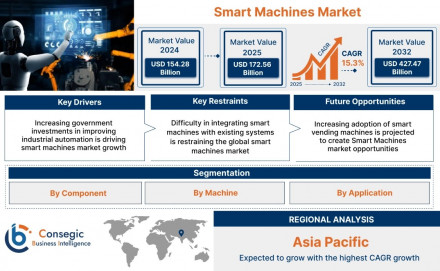Smart Machines Market: Challenges and Investment Insights (2025–2032)

Smart Machines Market Size:
Smart Machines Market Size is estimated to reach over USD 427.47 Billion by 2032 from a value of USD 154.28 Billion in 2024 and is projected to grow by USD 172.56 Billion in 2025, growing at a CAGR of 15.3% from 2025 to 2032.
Smart Machines Market Introduction:
The Smart Machines Market encompasses a range of intelligent systems capable of making autonomous decisions or performing tasks without human intervention. These machines integrate artificial intelligence (AI), machine learning, robotics, and advanced sensors to perceive environments, learn from data, and adapt to dynamic conditions. Common types include autonomous robots, smart personal assistants, self-driving vehicles, drones, and cognitive computing systems. Their application spans industries such as healthcare, automotive, manufacturing, aerospace, and defense, where automation, efficiency, and intelligent operations are paramount.
Smart Machines Market Overview:
The market for smart machines is experiencing significant growth due to the rising demand for automation and intelligent decision-making across industries. The market is characterized by increasing integration of AI and machine learning technologies, advancements in sensor systems, and rising adoption of Internet of Things (IoT). Organizations are investing heavily in smart machines to optimize processes, enhance productivity, and reduce operational costs. Additionally, the market is witnessing a shift toward human-machine collaboration, enabling smarter business operations and improved customer experiences.
Smart Machines Market Includes Drivers, Restraints & Opportunities
Drivers:
- Automation and Efficiency: Organizations seek to automate repetitive and labor-intensive tasks, leading to increased demand for smart machines in manufacturing, logistics, and service industries.
- Artificial Intelligence Advancement: AI technology has matured significantly, enabling machines to perform complex cognitive tasks such as natural language processing, image recognition, and autonomous decision-making.
- Industrial 4.0 Adoption: The global shift toward Industry 4.0 is boosting the use of intelligent systems in production lines, quality control, and predictive maintenance.
- Demand in Healthcare and Automotive: Applications in robotic surgery, patient care, and autonomous vehicles are expanding, contributing to market growth.
Restraints:
- High Initial Costs: The development, deployment, and maintenance of smart machines require significant capital investment, which can be a barrier for small- and medium-sized enterprises (SMEs).
- Data Security Concerns: Smart machines process vast amounts of data, making them vulnerable to cyber threats and data breaches.
- Complex Integration: Integrating smart machines into existing infrastructure and workflows can be technically complex and time-consuming.
- Regulatory and Ethical Issues: Autonomous decision-making raises questions around accountability, privacy, and compliance with regional regulations.
Opportunities:
- Emerging Economies: Growing industrialization in developing countries offers untapped potential for smart machine applications in agriculture, manufacturing, and healthcare.
- AI-as-a-Service (AIaaS): The rise of cloud-based AI services enables companies to integrate smart capabilities without extensive on-premises investment.
- Human-Robot Collaboration (Cobots): Increasing focus on cobots in workplaces to enhance human productivity without replacing jobs opens new avenues.
- Smart Cities and Infrastructure: Urban development and smart city projects drive demand for intelligent surveillance systems, autonomous public transportation, and smart utilities.
Smart Machines Market Competitive Landscape Analysis (Key Players)
- FANUC Corporation (Japan)
- Yaskawa Electric Corporation (Japan)
- Omron Corporation (Japan)
- Hyundai Robotics (South Korea)
- Universal Robots (Denmark)
- KUKA AG (Germany)
- Rockwell Automation, Inc. (United States)
- Siemens AG (Germany)
- Mitsubishi Electric Corporation (Japan)
- Honeywell International Inc. (United States)
- General Electric Company (GE) (United States)
- Robert Bosch GmbH (Germany)
- NVIDIA Corporation (United States)
Smart Machines Market Industry Segmentation:
By Component
- Hardware
- Software
- Services
By Machine
- Robots
- Autonomous Cars
- Drones
- Wearable Devices
- Others
By Application
- Manufacturing
- Transportation & Logistics
- Healthcare
- Consumer Goods and Retail
- Aerospace & Defense
- Others
By Region
- Asia-Pacific
- Europe
- North America
- Latin America
- Middle East & Africa
Regional Analysis of the Smart Machines Market:
- North America: Dominates the market due to technological innovation, significant R&D investment, and high adoption of AI in industries. The U.S. is a major hub for AI and robotics development.
- Europe: Follows North America with strong growth in Germany, the UK, and France. The region is investing in smart manufacturing and autonomous mobility.
- Asia-Pacific: Expected to witness the fastest growth due to rapid industrialization in China, India, and Japan, coupled with increasing adoption of automation in production processes.
- Latin America and Middle East & Africa (MEA): Emerging regions with growing interest in smart technologies, particularly in agriculture, healthcare, and public safety.
Smart Machines Market Recent Developments:
- IBM and NASA announced a partnership to apply AI to climate change modeling using smart machine learning algorithms.
- Boston Dynamics introduced new AI-powered robotic systems for warehouse automation.
- NVIDIA released next-gen AI processors optimized for smart machine applications in robotics and autonomous vehicles.
- Apple enhanced Siri with contextual intelligence and expanded its smart assistant capabilities in iOS updates.
- Google’s DeepMind launched Gemini AI models designed for broader integration in robotics and cognitive machines.
Contact us:
Consegic Business intelligence Pvt Ltd.
Contact no: (US) (505) 715-4344
Email: sales@consegicbusinessintelligence.com

